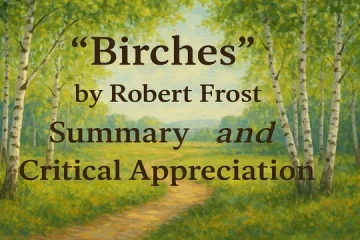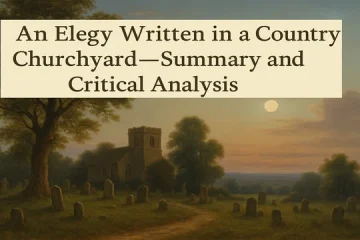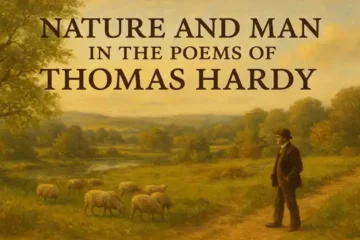Introduction:
Robert Frost occupies a unique place in American poetry as a poet of the countryside who explored universal truths through the language of rural life. His work often resonates with a strong pastoral note, reflecting his deep engagement with the natural world, the rhythms of farm life, and the struggles of ordinary people living close to the land. Unlike the conventional pastoral poetry of earlier centuries that idealised rustic simplicity and painted a romantic picture of shepherds and meadows, Frost’s pastoral vision is marked by realism, tension, and philosophical depth. He draws from the New England landscape not merely for scenic beauty but as a stage on which human emotions, moral choices, and existential dilemmas unfold.
Through poems such as Mending Wall, Stopping by Woods on a Snowy Evening, and After Apple-Picking, Frost blends natural imagery with reflections on isolation, duty, transience, and human resilience. His pastoral mode is thus both traditional and modern: rooted in the soil of rural experience yet alive with psychological insight and symbolic resonance. Studying the pastoral note in Frost’s poetry helps us understand how he transformed the genre into a medium of profound philosophical exploration while staying faithful to the simplicity of rural speech and imagery.
Pastoral Note:
As we study the poetry of Robert Frost we find the pastoral note in a large measure. In fact, the pastoral poetry is that poetry which is related with the life, character and activities of the common and simple people living in the countryside. They love their work and get adequate pleasure out of their such life. They are equally happy both with their joys as well as with their difficulties.
Such country life develops with the background of trees, their fruits and flowers and green atmosphere. It is also rich with the beautiful natural scenes. Such pastoral poetry was much liked and composed by the Greek poets as well as by the poets during the Renaissance. We also find such pastoral description in Milton’s “Lycidas”. Robert Frost’s poetry has also pastoral note.
Rural Themes:
As we study the poetry composed by Robert Frost, it is rich with rural themes along with pastoral note. His poetry is totally free from conventional elements. It is also free from artificial form. In this way, Robert Frost had made use of simplicity and natural form in his poetry like the Greek poets and other men – of – letters. Its reason is that, a large number of his poems are dominated by such rural themes. The greatness of the poet for such poetry is recognised in all countries of the world. His greater poetry deals with rural life, his pastoral poetry being in the central place. His “Collected Poems” is its best example.
Rural Characters:
As we study the poetry composed by Robert Frost we find that his characters are very well – expressed along with their habits and other ways of life. The great poet was very fond of New England, or the Northern part of Boston which provided the rural inspiration for him. His most important poems are its best example.
The common people, or the characters of his poetry are closely and correctly expressed by him. His characters are mostly from New England or the neighbouring parts. His poetry is the real image of their habits and their ways of life. His poetry also shows their beliefs, ideals and ways of conduct. The following lines from “Apple – picking” clearly show a tired farmer returning home after his labour of picking apples,
“…… and there may be two or three,
Apples I didn’t pick upon some bough.
But I am done with apple – picking now,
Essence of winter sleep is on the night,
The scene of apples; I am drowsing off.”
As we study the rural and pastoral poetry composed by Robert Frost we find his characters of New England and of other nearing places of Boston with their natural and real virtues of simple and thrifty life. The people have rugged body and work hard on their land, or in their gardens to receive the fruits of their labour. Certainly the people are hard – working and economical.
His Quality of Realism:
As we go on studying the poems of Robert Frost we find that they show his natural quality of realism. It was his great art that he used to glorify rural life which was very dear to him. He used to do it with inner heart and real happiness. His treatment of rural life was most realistic. He did not make it philosophical. He made an expression of such rural and pastoral life with the natural instincts of mutual love, hatred, joy and sorrow.
We also find a detailed description of rural life in the most realistic style. As long as he stayed in England, he lived the life of a farmer from his boyhood upto his maturity. If poetry was his vocation, farming was his hobby. He combined the two in his poetry with a rich experience of rural life. For example , in his poem “After Apple – picking”, the man who fell asleep after picking apples saw only apples in his dream. The following lines are also a very significant part of his poetry:
“But I have promises to keep,
And miles to go before I sleep.”
His Universality:
As we study the poetry of Robert Frost, we find the quality of universality in all its parts. As he composed his poetry, he never forgot the sad condition of humanity far and wide. When he wrote about rural life, he saw an image of misery even in their hard life. He was highly touched when he saw the people’s frustration and their emotional isolation. In the course of composing his poetry he never shut his eyes even to the unpleasant aspects of life. For Robert Frost, his rural world was not a happy dream, so he could not ignore the sorrow and suffering of the life of rural people.
It is true that Robert Frost tried to show the representation of life at large both with its joys, and sorrows. He tried to show that the common people live in a hostile environment where the people struggle against heavy odds. After forgetting their hard reality, he could fly into the world of imagination but only for a few moments. Soon he returned to the earth because he regarded it the proper place for himself. His popular poem, “Birches” clearly shows his change from fact to imagination, vice – versa. In his poetry we do not get imaginative picture of rural life but he shows it in a highly realistic manner.
Symbolic Value:
The study of the poetry of Robert Frost clearly shows its symbolic value in a large measure. It is true that the poetry of the great poet is very simple but this quality of simplicity is closely related with his love and attachment with rural life. Most of his poems are highly symbolic as well as suggestive. The more we study his poems with interest and attention the more we find the real significance of his poetry. The meaning of his poetry is always very suggestive.
For example, his important poem “Stopping by Woods on a Snowy Evening” clearly shows Robert Frost’s use of symbolism as well as suggestiveness. Its real meaning is that a man should sacrifice his desires for pleasure and rest. On the other hand, he should go on doing his duty regularly and laboriously. This is the reason that Pandit Jawaharlal Nehru, the first Prime Minister of free India used to take much interest and inspiration from the last four lines of this poem which were found from his table of the study room after his death on May 27, 1964.
Robert Frost’s another popular poem with the title “Mending Wall” presents a very impressive incident from rural life and it is also highly suggestive. The word, ‘wall’ shows the symbol of different kinds of problems which divide man from man. Caste conflicts, religious differences and economic inequalities, all these elements are suggested in a fine manner. The poet tries to show human values and ideals of life.
Conclusion:
After making a close and serious study of the poetry of Robert Frost we find that his characters and incidents from rural life are very symbolic. In the same way, the poet has used suitable diction and versification in the composition of his poetry.
All his diction, phrases and idioms are from the same language which is spoken and understood by the people of the countryside of the New England. His characters speak the same language which is quite suggestive. It is the language which is used by men and women in the rural areas . Such places always remain in the background of his poetry. His pastoral poems indicate the similar tone. In short the rural and pastoral poetry of Robert Frost is highly impressive and realistic.




